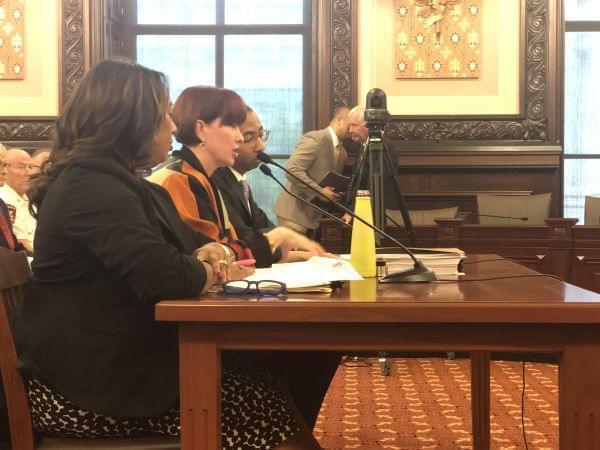Significant Changes Expected In Illinois’ Recreational Cannabis Proposal

Deputy Gov. Christian Mitchell, Sen. Heather Steans, and Sen. Toi Hutchinson provide details to lawmakers regarding the recreational cannabis proposal. Jaclyn Driscoll/NPR Illinois
Illinois has an official proposal to legalize recreational cannabis, but the bill language is still a work in progress. On Wednesday, legislators in the Senate Executive committee were able to pick apart details of the legislation and make suggestions for changes.
State Sen. Heather Steans (D-Chicago) is the lead sponsor of the recreational cannabis proposal in the Senate. In the hearing, she unveiled new revenue estimates for the program if lawmakers decide to approve the measure by the end of May.
She said next year, the state can expect to generate roughly $56 million in tax revenue, growing to roughly $140 million the following year.
“When it’s fully mature, we’ll have about $500 million dollars that we’re receiving from sales," said Steans. "But that’s not likely to reach that point for at least five or six years or so, as what we've seen in other states to get to that maturity."
A "mature" market means people using cannabis are gaining access to the drug legally, rather than purchasing product off the illicit market. Colorado legalized recreational cannabis in 2012 and Steans said they have since reduced their illegal market by 75 percent.
"That's our goal," she said.
The sponsors and Gov. J.B. Pritzker have said legalizing cannabis is not about the revenue. It's more about social justice and helping communities that have been negatively impacted by the war on drugs. Still, the governor included $170 million in his budget proposal just from new licenses for the program. That does not include the tax dollars. The administration said they will need to scale those numbers down and make up the revenue in other places.
State Sen. Jason Barickman (R-Bloomington) has said he wants to see more of the revenue from the program going toward Illinois' bill backlog. As of now, only 10 percent of the money from the program is allocated for that purpose.
Barickman also took issue with the Restoring Our Communities (ROC) grant that is created by the proposal. The money will be available to, what this legislation calls, "disproportionately impacted areas." As it's written, the measure allocates 25 percent of the revenue from the program to fund this grant. While Barickman said he agrees with the concept, he's not sure it's an efficient use of the money given Illinois' financial state.
"When (the ROC grant) is not funded through the budget, it diminishes the oversight the legislature has in where these dollars are going," he said. "Effectively as proposed, to the extent cannabis revenues are generated year after year, some of those revenues, into perpetuity, get placed into this fund. I think there's a legitimate concern there that we all in the legislature should have."
The communties that will be eligible to receive this grant money are still being decided. Barickman said he would like to see areas impacted by the opioid crisis to also be included.
State Sen. Kimberly Lightford (D-Maywood) disagreed. She said the war on drugs was a very different crisis.
"Social equity is social equity," said Lightford. "We receive money for (opioids) in the budget. It has zero to do with legalizing cannabis and addressing a specific issue. So, I would hope that we don't mix the two because there is no correlation."
The proposal also allocates a portion of the revenue to public education campaigns, law enforcement, mental health and substance abuse programs, and the general revenue fund. While sponsors say those numbers can still change, equity and social justice will remain important.
"We were very thoughtful and deliberative as to try to figure out where the revenue allocations should go from a policy standpoint, as well as for the fiscal health of this state," said state Sen. Toi Hutchinson (D-Olympia Fields). "Knowing that from a policy standpoint, the revenue as it grows, is something that we need to be watchful for but not if we don't get the policy right on the front end."
The policy also allows adults 21 years and older to grow up to five plants in their home, as long as they are in a locked room and not in plain sight. This has been a contentious issue in negotiations and Deputy Gov. Christian Mitchell said he anticipates substantial changes.
State Sen. Dale Righter (R-Mattoon) is one of many legislators that have questions about the home grow component. Righter said he is concerned that people choosing to grow plants at home will not be regulated on the potency of their plants, and could go beyond what the law allows.
Steans said this is not a real concern: "There's only so much potency you can get in your plant," she said. "The higher potency can come when you infuse and make other products. It can only go to about 35 percent in a plant. The plant just can't get more potent than that."
The process of expunging criminal records and how employers can maintain a drug-free workplace are also some items included in the legislation that are expected to change.

